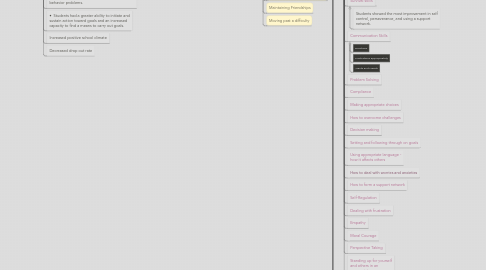
1. Students’ behavior problems in the classroom decreased by 13 percent.
1.1. Problem Solving
2. • Students emotionally showed more internal control and less social stress and anxiety.
3. Student results when participating in a social skills program (specifically Why Try Program)
3.1. Students reduced failing grades by 47%
3.2. Students receiving WhyTry had significantly less disciplinary referrals, reduced fighting/aggressive behavior and harassment/bullying behavior.
3.2.1. Embedded in curriculum
3.3. • The average number of Behavior Incident Reports decreased by 20 percent, indicating less behavior problems.
3.4. • Students had a greater ability to initiate and sustain action toward goals and an increased capacity to find a means to carry out goals.
3.5. Increased positive school climate
3.6. Decreased drop out rate
4. The average student GPA increased by 11 percent.
5. Negative environmental influences
6. Difficulties that students with poor social skills face?
6.1. Maintaining Friendships
6.2. Poor impulse control
6.3. Applying and generalizing
6.4. Expressing needs and wants
6.5. Seeing beyond present situation
6.6. Maintaining Friendships
6.7. Moving past a difficulty
7. Characteristics/Physical or Mental Problems
7.1. Low self esteem
7.1.1. Skills that Some Social Skills Programs Teach
7.1.1.1. Conflict resolution
7.1.1.2. Survival skills
7.1.1.2.1. Students showed the most improvement in self control, perseverance, and using a support network.
7.1.1.3. Communication Skills
7.1.1.3.1. Emotions
7.1.1.3.2. Frustrations appropriately
7.1.1.3.3. Wants and Needs
7.1.1.4. Problem Solving
7.1.1.5. Compliance
7.1.1.6. Making appropriate choices
7.1.1.7. How to overcome challenges
7.1.1.8. Decision making
7.1.1.9. Setting and following through on goals
7.1.1.10. Using appropriate language - how it affects others
7.1.1.11. How to deal with worries and anxieties
7.1.1.12. How to form a support network
7.1.1.13. Self-Regulation
7.1.1.14. Dealing with frustration
7.1.1.15. Empathy
7.1.1.16. Moral Courage
7.1.1.17. Perspective Taking
7.1.1.18. Standing up for yourself and others in an appropriate way
